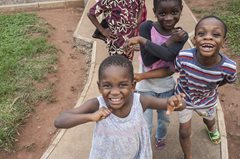Families struggle to stay together due to unemployment and poverty
With a total population of roughly 186 million, Nigeria is one of the world's most populous countries.
Nearly half of the population lives in cities, and the number of people moving to urban areas is increasing. As cities grow quickly, many families end up living in inadequate housing: in shacks without access to sanitation or safe drinking water.
Nigeria is one of the poorest and most unequal countries in the world. Although it is rich in petroleum, natural gas, tin and coal, over 60 per cent of its people live in poverty. There are big regional differences; the highest levels of poverty are found in the northern areas of the country. These are also the areas that are most affected by political instability.
Mothers and children suffer from the lack of health care
In spite of recent efforts, Nigeria continues to face serious health challenges. The lack of security and the high number of people suffering from HIV/AIDS means that life expectancy is fairly low and mortality rates remain high.
In some areas, people do not have access to appropriate medical care: it is either hard for them to reach a health centre or they can’t afford to pay for treatment. Although the government has made noticeable efforts in the field of maternal healthcare, much is yet to be done in order to improve the situation of thousands of women and young children. The majority of women do not have antenatal care and only about fifty per cent of births are attended by a skilled health professional. As a result, both the maternal mortality and infant mortality rates are amongst the highest in the world.
But the main health challenge is HIV/AIDS. The extent to which the disease marks the lives of the Nigerian people is beyond comparison. Around 3.4 million are living with HIV/AIDS and approximately 240,000 die from it every year. HIV/AIDS is a major cause of the deepening poverty in the country.
Millions of children are in need of support
In spite of recent initiatives to improve the lives of Nigerian children, millions are still in need of protection.
Around 11 million children under the age of 14 are forced to work in Nigeria, many of them under extremely hazardous conditions. They do so for little or no pay while missing out on a decent education. An estimated 10.5 million children don’t go to school.
HIV/AIDS also affects children. Approximately 2.2 million children have lost parental care due to AIDS, and 430,000 children live with HIV/AIDS. Children whose parents are HIV-positive are especially vulnerable, if the parents become too weak to work, children have to step into the role of providers and carers.
Malnutrition is a growing problem, with 2.5 million children suffering from severe acute malnutrition. The situation is particularly serious in the north of the country, where malnutrition is the main reason why children die.
SOS Children's Villages in Nigeria
SOS Children’s Villages has been protecting and supporting vulnerable children since the early 1970s.
Strengthening Families: In seven locations throughout Nigeria, we work with the local communities and organisations to ensure that families can stay together. The help we provide varies depending on the needs of each family but can include medical care, counselling, as well as nutritional and material support. In 2015, we supported over 15,000 adults and children.
Care in Families: If, in spite of our assistance, children lose the care of their parents, they find a loving home in an SOS Children’s Village. Brothers and sisters grow up together in SOS families. Wherever possible, we work with the families of origin so that children can return to live with them.
Education: We run kindergartens and primary schools in Abuja, Isolo, Jos and Owu-Ijebu. Children from the local community attend alongside children in the care of SOS Children’s Villages. In Abuja we also offer secondary school education. Over 930 children can benefit from our educational services throughout the country. In addition to running kindergartens and schools, we also train local teachers. We are also planning to open a vocational training centre for young people to learn about agriculture.
Support for young people: The high unemployment rate makes it difficult for young people to become independent. We provide young people with support, training and advice until they are able to live on their own.
Emergency Programme: For more than a decade, the conflict in north-east Nigeria has put children at risk of violence, disease, malnutrition and poor education. In late 2018, we planned new support to address these risks and keep children safe.
Advocacy: SOS Children's Villages works with the government and other agencies to promote social reform that improves the rights of children in the country.
Website of SOS Children's Villages Nigeria
(available in English)


.jpg?width=240&height=180)